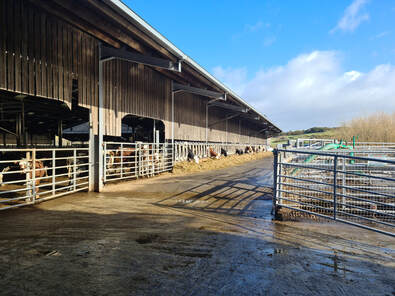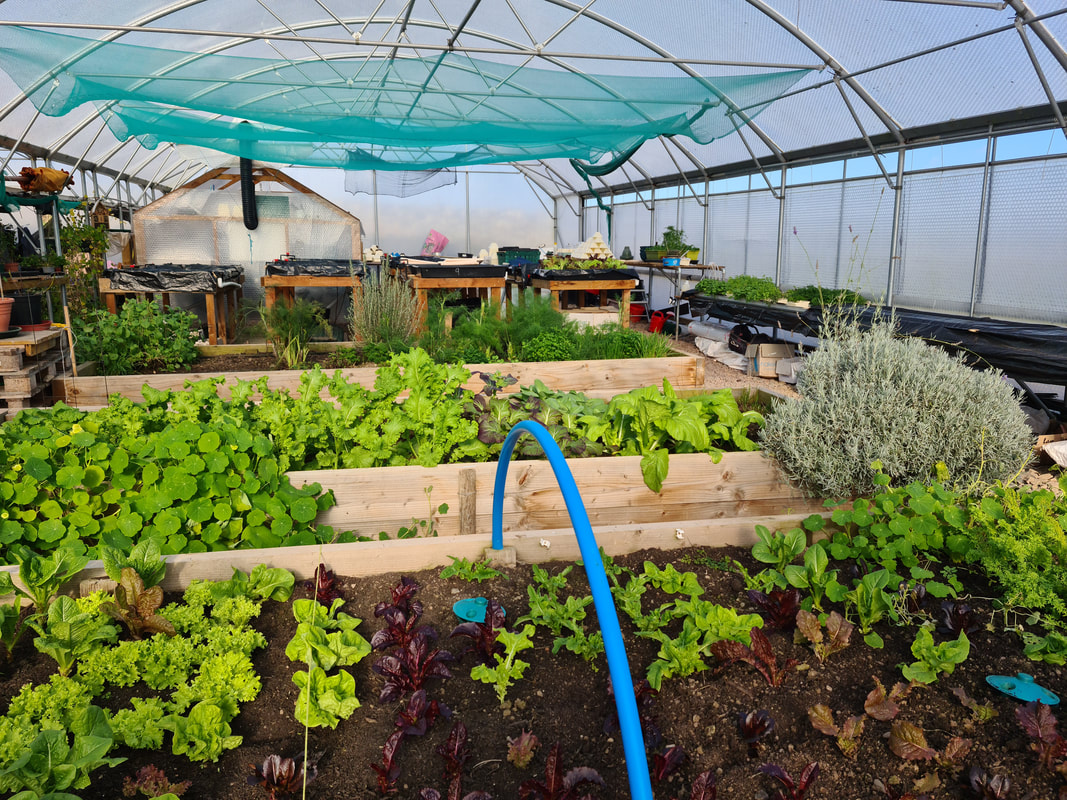 Dispatches from Dumfries and Galloway On departing Glasgow, I took a wee detour to Ayr to acquire some new wellies in anticipation for the next day’s farm visits in Dumfries and Galloway. As Storm Franklin continued to blow through Monday night, I woke up to howling wind and rain early on Tuesday morning. A quick check of the Met Office app reassured me that by 9am there would be calm and sun and so it was. For two of my three Dumfries and Galloway site visits (The Ethical Dairy and SaladBrew), I was joined by Finlay Carson MSP and Convenor of the Rural Affairs, Islands and Natural Environment Committee. Our first stop was the Ethical Dairy (and Cream O’Galloway) where we were met by the owners David and Wilma Finlay. Over 25 years, they have been ploughing their own road from originally being a conventional dairy farm to a fully organic farm and dairy (producing cheese and ice cream) and more recently (into 6th year) an innovative dairy cow/calf system. The calves stay with their mothers for 5-6 months (who are milked just once-a-day after 6-8 weeks), though they separated at night, normally from about 6-8 weeks of age to prepare them for weaning, to help their rumen development and to ensure we get at least a little milk from the cows in the morning. After weaning they milk the cows twice-a-day, as they are still producing a lot of milk for the next couple of months, or so. It then reverts back to once-a-day milking. Whilst this reduces the overall milk yield/cow, the system delivers other benefit requiring little or no additional inputs (apart from grass-based feed produced on the farm), producing very fast growing calves (grow twice as fast as in conventional systems), improving animal welfare and wellbeing (calm, relaxed, comfortable animals), extending the productive life of the dairy cows (on average 9 years) and enhancing working conditions. About 85% of the milk produced is processed on the farm for cheese and ice cream production. Between the farm, dairy (cheese and ice cream), café and retail/management operation, the Ethical Dairy (and Cream O’Galloway) is employing approximately 30 staff, producing high welfare milk, beef calves and lamb, supporting the local economy (tourism and retail), driving up biodiversity and environmental standards across the farm, reducing reliance on expensive inputs (feed; fertilisers; antibiotics) and working collaboratively with public and private supply chains to grow and diversify their business. Our 2nd stop was to Salad Brew, a small hydroponics salad and vegetable farm in Borgue. Rod and Anne Bannatyne set it up in 2017, after being inspired by seeing another operation whilst on holidays in the north of Scotland. Originally a retirement project for Rod they made an initial investment of approx. £26k to build their innovative Kater House (a glass house style construction but with bubblewrap insulation instead of glass). They are growing salad, microgreens, tomatoes, peppers and chillies (to name a few) using a hydroponics system supported by collected rainwater and solar panels for renewable power. Their growing season extends from March to September/November depending on how damp the weather gets in September. They are supplying directly to local customers, one local retail shop and a few food service/hospitality outlets. They have the capacity, and interest, to increase production with supported investment. This funding could go towards installing mini vertical farming equipment or generating the power to heat the kater house. They have encountered challenges with applying for funding and navigating the complex bureaucracy associated. They believe there is great opportunity to grow the network of kater houses/poly tunnels/poly curbs in Dumfries and Galloway in order to grow the quantity and diversity of locally grown vegetables and greens. My 3rd stop was the innovative central food store managed and operated by Dumfries and Galloway Local Authority under the leadership of Alan Mawson. D&G are the only local authority in Scotland to have invested in and to manage a central food stores. All the school food (except fruit and vegetables and milk) are delivered to this central food store and then the Local Authority, using a fleet of vans, mange the distribution and logistics out to all their schools across D&G. This system facilities D&G to have much greater oversight of, and agility with, their school food deliveries, manage the geographical challenges associated with this part of Scotland, engage in innovative logical management (including back hauling) and facilitates forensic processes for checking, and adjusting, how they do school food from a procurement perspective. Across the 3 sites, and through our detailed discussions, the following issues kept cropping up: 1. Workforce and Housing
2. Viability and Sustainability of Dairy Farming
3. Local Economic and Social Development
4. What does a 20 minute neighbourhood look like, and mean for, Rural Communities
5. Public Food Procurement
0 Comments
|
AuthorProfessor Mary Brennan - Chair of the Scottish Food Coalition ArchivesCategories
All
|
Proudly powered by Weebly


 RSS Feed
RSS Feed